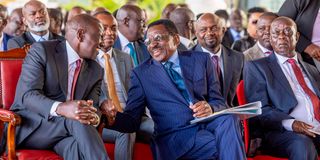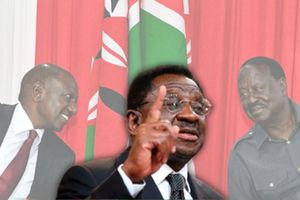
President William Ruto, Siaya Governor James Orengo and the Senator Oburu Oginga when he hosted leaders and business people from the county at State House, Nairobi on June 5, 2025.
A visit to the State House by a delegation from Siaya County led by Governor James Orengo has unlocked major infrastructure projects by the national government.
The visit, which took place after months of a political standoff between President William Ruto and Mr Orengo, saw leaders from the region close ranks to lobby for various development projects for the county’s six constituencies.
The President announced a Sh1 billion investment in the blue economy, including Usenge Pier and its attendant port facilities at Sh600 million, as well as a fish market at Sh400 million.
He said the government will also build 16 markets in the county at Sh2.5 billion. Another Sh1.6 billion has been set aside for the last mile electricity programme to connect a total of 16,000 households.
On the expansion of Odera Akang'o University, President Ruto said the government would finalise the plan to acquire more land for the institution.
He also promised to complete stalled infrastructure projects at Jaramogi Oginga Odinga University of Science and Technology.
“We will also construct 16 markets in the County at a cost of Sh2.5 billion and allocate Sh1.6 billion in the connection of more than 16,000 households to power to drive entrepreneurship,” said President Ruto.
In a memorandum presented by Mr Orengo, the team requested for completion of some of the ongoing projects in the six constituencies.
“We acknowledge with deep gratitude the inclusive governance approach espoused in collaboration with the Prime Minister, Raila Odinga.

President William Ruto, Siaya Governor James Orengo, Energy CS Opiyo Wandayi (left) and Alego Usonga MP Samuel Atandi (right) when he hosted leaders and business people from the county at State House, Nairobi on June 5, 2025.
This spirit of partnership has significantly fostered national unity and laid a strong foundation for shared prosperity across the nation,” said Mr Orengo, who in the past has been critical of the broad-based government.
Present at the meeting were Energy Cabinet Secretary Opiyo Wandayi, Siaya Senator Oburu Oginga, MPs, MCAs, and clergy. Former ICT Cabinet Secretary Eliud Owalo and former Jubilee Secretary General Raphael Tuju were also present.
In Rarieda constituency, the leaders sought the intervention of the national government for the completion of the Wang’arot – Kalandini Road, construction of the Lake Victoria Ring Road, construction of Luanda Kotieno, and upgrading to bitumen standards of Akado-Kalandini-Kaelija road.
Others include the construction of the Gagra – Madiany – Ndigwa – Nyabera/Agok beach road, the construction of modern fish markets in Misori, Aram, and Ndori, the construction of the modern State of the Cotton Ginnery in Madiany and the development of Asembo Bay pier, a mini port and fish landing site to boost the blue economy.
Rarieda MP Otiendo Amollo, who was part of the State House delegation, told the Nation that Luanda Kotieno Fish Processing Plant has since been completed while building hostels at Rarieda Technical Training Institute (TTI), construction of Akado-Kalandini and building of modern market at Riat other projects are already ongoing.
In Ugenya, the leaders are pushing for the national government to fund the construction of Got Nanga – Bar Ober Road, last-mile connectivity through the Ugunja – Sega - Ukwala Water Project, and revival of the Anyiko – Ujwanga – Kathieno Irrigation Scheme to unlock 1,200 acres for rice production.
In Ugunja, the modernisation of Ugunja Ring Road and Municipal Market, parking Bay and dualling of Ugunja Highway, affordable Housing Programme in Ugunja municipality, and Construction of hostels at Ugunja KMTC and TVC top the list of projects the leaders requested from the national government.
Others are the proposed construction of ESP markets in Kayombi, Sidindi, Ligega, and Sikalame as well as the upgrading of Segere – Ogaso – Yenga - Sega Road to bitumen standard.
In Gem Constituency, the leaders lobbied for the upgrading of Bar Kalare - Siala road to bitumen standard, the upgrading of Yala- Anyiko- Butere road to bitumen standard, construction of hostels at Gombe, Yala and Wagai and students’ hostels at KMTC as well as the upgrade of Kodiaga–Sirembe–Rabango- Ratuoro Road to bitumen standard.
In Bondo, the delegation requested for funding the completion of the Goye Bridge, the upgrading of the Bondo – Uyawi – Nango - Liunda Beach road to bitumen standard, the dualling of the Bondo ACK- Kisumu – Usenge road, and the upgrading of the Migwena Airstrip.
In the Alego Usonga constituency, the team lobbied for the completion of Phase I of Jaramogi Oginga Odinga Stadium which requires a canopy, tarmac, and inner ring road.
They also sought additional funds for Phase 2 to upgrade the stadium to a fully-fledged sports centre, acceleration of the Affordable Housing Programme in Siaya Municipality, and construction of hostels at Siaya Institute of Technology.
Other projects requested include the funding of the County Aggregation and Industrial Park, completion of Phase I of the Lower Nzoia Irrigation Project, upgrading of Segere–Ogaso–Yenga–Sega Road to Bitumen standard, and upgrading of Ulafu – Nyalgunga- Kobare road to bitumen standard.
President Ruto explained that Siaya, among other counties, would benefit from the government's revival programme of cotton farming, a sector that holds great potential to create thousands of jobs and incomes for farmers.
"We export $500 million (Sh65 billion) worth of textile products to the United States annually, but we import most of the textiles used to make the garments. This must change," he said.
He expressed his gratitude to Mr Odinga for agreeing to work with him in the broad-based government.
"Whenever we have found ourselves at a crossroads as a country, Baba, being the great statesman that he is, has always taken bold decisions in the best interest of this nation," President Ruto pointed out.
"Our transformative programs, including the leasing of public sugar factories to make them profitable, would not have been possible without the broad-based government," he said.






